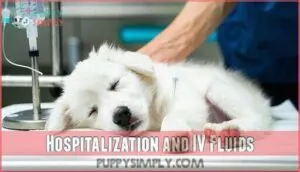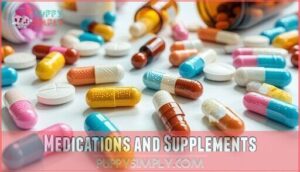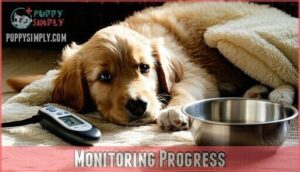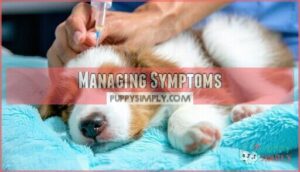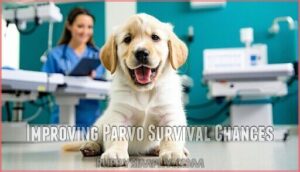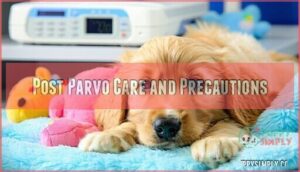This site is supported by our readers. We may earn a commission, at no cost to you, if you purchase through links.
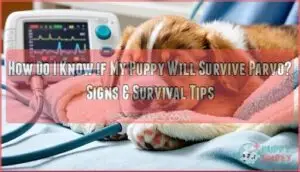
Look for decreased vomiting, renewed appetite, increased energy levels, and less blood in their stool. These improvements typically appear within 3-5 days of proper veterinary care.
Your pup’s age matters too – older puppies have better survival odds than tiny ones under 12 weeks.
Early treatment is everything here, so don’t wait if you suspect parvo. With aggressive IV fluids, anti-nausea medications, and round-the-clock monitoring, survival rates jump to 80-90%.
The first 72 hours are critical, but several key factors can tip the scales in your favor.
Table Of Contents
- Key Takeaways
- Parvo Survival Rates
- Will My Puppy Survive Parvo
- Parvo Treatment Options
- Parvo Recovery Process
- Parvo Prognosis Factors
- Improving Parvo Survival Chances
- Post Parvo Care and Precautions
- Frequently Asked Questions (FAQs)
- How to know if a puppy with parvo is getting better?
- How long until a puppy is safe from parvo?
- What preventive measures can I take to protect my puppy from parvo?
- How long does it take for a puppy to recover from parvo?
- Can an adult dog contract parvo?
- How can I tell if my puppy is immune to parvo?
- Are there any vaccinations available to protect my puppy from parvo?
- Can parvo survivors spread virus to other dogs?
- How long does parvo immunity last after recovery?
- What disinfectants effectively kill parvovirus in the environment?
- Conclusion
Key Takeaways
- Watch for signs like decreased vomiting, returning appetite, firmer stools, and increased energy within 3-5 days of early treatment.
- Early treatment is critical—getting veterinary care within 24-48 hours of symptoms boosts survival rates to 80-90%.
- Vaccination is your best defense; follow the schedule at 6, 8, and 12 weeks to protect your puppy.
- Maintain strict hygiene and avoid high-risk areas like dog parks to prevent infection or reinfection.
Parvo Survival Rates
You’ll find hope in knowing that puppies with parvo have survival rates between 68% and 92% when they receive proper veterinary treatment.
Your pup’s chances improve dramatically with early diagnosis and aggressive care, especially if they make it through the first four critical days.
Factors Affecting Survival
When evaluating your puppy’s parvo survival rate, several critical factors come into play.
Your puppy’s immune response strength, breed predisposition, and underlying health substantially impact parvo prognosis.
Viral load exposure, concurrent infections, and symptom severity determine outcomes.
Male puppies face higher risks than females, and treatment timing remains vital – the earlier you act, the better your puppy’s parvo chances become.
Importance of Early Treatment
Your puppy’s survival chances dramatically improve with rapid diagnosis and immediate action.
Time is your puppy’s greatest ally in the fight against parvo—every hour of delay could mean the difference between life and death.
The treatment window for parvo is narrow—every hour counts when parvo symptoms puppy appears.
Veterinary access within 24-48 hours of parvo early signs can mean the difference between life and death.
Early parvo diagnosis puppy and prompt parvo treatment puppy create the survival impact that saves lives.
Role of Vaccination
Vaccination remains your puppy’s strongest defense against parvo, though timing matters tremendously.
Maternal antibodies can interfere with vaccine efficacy during early weeks, making the standard vaccination schedule at 6, 8, and 12 weeks essential.
Your parvo vaccine puppy series isn’t foolproof, but it dramatically improves puppy parvo survival rates.
Booster importance can’t be overstated for maintaining herd immunity protection.
Will My Puppy Survive Parvo
Several key factors determine your puppy’s parvo prognosis puppy outlook.
Age plays a huge role – puppies under 16 weeks face steeper odds, while older pups generally show better puppy parvo survival rates.
Your breed matters too, as certain breeds have higher breed predisposition to severe complications.
Veterinary access makes or breaks survival chances.
Professional treatment boosts puppy parvo chances from roughly 10% without care to 68-92% with proper intervention.
Cost concerns shouldn’t delay treatment – many vets offer payment plans for emergencies.
Watch for survival indicators like decreased vomiting frequency, firmer stools, and returning appetite.
These positive signs suggest your pup’s turning the corner.
Owner vigilance is your secret weapon – catching symptoms early and maintaining strict hygiene protocols substantially improves the puppy parvo survival rate.
Your puppy’s individual immune system strength ultimately determines the outcome, making quick action your best ally.
Parvo Treatment Options
When your puppy contracts parvo, you’ll face several treatment paths that can substantially impact their survival chances.
Professional veterinary care offers the highest success rates, but home treatment options exist for those who can’t afford hospitalization or prefer alternative approaches, which can be a veterinary care alternative.
Hospitalization and IV Fluids
When professional parvo vet care becomes necessary, hospitalization provides round-the-clock monitoring your puppy needs.
Intravenous drips deliver essential fluids directly into the bloodstream, combating severe parvo dehydration puppy symptoms effectively.
Different IV fluid types restore electrolyte balance while infection control protocols prevent complications.
Hospitalization duration typically spans 3-7 days, though cost considerations average $1,500-$3,000 depending on severity and required monitoring hydration levels.
Home Treatment and Care
When professional veterinary care isn’t financially feasible, parvo home treatment requires vigilant monitoring and supportive care.
Your puppy’s survival depends on maintaining proper hydration and creating a stress-free home environment for recovery.
Essential parvo supportive care includes:
- Hydration management – Administer subcutaneous fluids and rehydration solutions to combat parvo dehydration puppy symptoms
- Nutritional support – Offer easily digestible baby food using syringes for puppy parvo recovery
- Environmental control – Maintain quarantine and thorough disinfection to prevent reinfection
- Symptom monitoring – Track vomiting, diarrhea, and energy levels hourly for puppy survival assessment
Consider using specialized electrolyte solutions for effective rehydration.
Medications and Supplements
Your vet will prescribe specific medications to fight the infection and manage symptoms.
Antiviral medications like monoclonal antibodies directly target the virus, while antibiotics prevent secondary infections.
Immune boosters and probiotics help restore your puppy’s natural defenses.
Symptom relief comes through anti-nausea drugs and pain management.
Supplement timing matters—follow your vet’s schedule precisely for ideal parvo supportive care and improved puppy survival rate.
Parvo Recovery Process
Once your puppy starts treatment, you’ll need to watch for specific signs that show recovery is progressing.
The first four days are critical, and puppies who survive this period typically have much better chances of full recovery.
Monitoring Progress
Tracking your puppy’s recovery requires watching five key indicators that signal whether they’re turning the corner:
- Vital Signs – Temperature returning to normal range (101-102.5°F)
- Appetite Changes – Showing interest in food again
- Hydration Levels – Skin snapping back when pinched
- Stool Consistency – Less bloody, firming up gradually
- Activity Levels – More alertness and movement
Managing Symptoms
Managing your puppy’s parvo symptoms requires constant attention and quick action.
Focus on hydration techniques like offering small, frequent water sips to combat dehydration. Vomiting control through anti-nausea medications helps reduce fluid loss.
Diarrhea relief medications can ease discomfort, while pain management keeps your pup comfortable.
Monitor fever reduction closely, as high temperatures worsen the prognosis substantially.
Dietary Changes
Your puppy’s digestible food choices can make or break recovery.
Switch to easily absorbed options like plain rice and boiled chicken.
Supplement options include probiotics to restore gut health.
Hydration methods involve offering small, frequent water portions.
Practice strict portion control—little and often works best.
Consider using highly rated puppy food for easier digestion.
Avoid sugars completely, as they’ll worsen symptoms and compromise your puppy’s delicate nutritional needs during this critical healing phase.
Parvo Prognosis Factors
Several key factors determine your puppy’s chances of surviving parvo, and understanding these can help you gauge their prognosis.
Your puppy’s age, the severity of their symptoms, and how quickly you start treatment all play vital roles in their recovery outcome.
Severity of Symptoms
Your puppy’s symptom severity directly impacts survival rate and parvo prognosis puppy outcomes.
Bloody diarrhea and high vomiting frequency signal serious complications, while severe dehydration level requires immediate intervention.
Watch for lethargy signs and complete appetite loss – these parvo symptoms puppy indicators suggest critical illness.
Mild puppy symptoms typically mean better chances, but don’t underestimate symptom severity’s role in recovery.
Age and Health of Puppy
Younger puppies face steeper odds against parvo, with those under 16 weeks showing lower survival rates due to developing immune systems.
Your puppy’s overall health substantially impacts their parvo prognosis—puppies with strong nutritional status and no pre-existing conditions typically fare better.
While breed predisposition and genetic factors play minor roles, a robust puppy immune system remains your best ally in fighting this disease.
Effectiveness of Treatment
Quality veterinary care dramatically boosts your puppy’s survival rate from 10% without treatment to 68-92% with professional intervention.
Home treatment can achieve 85% recovery speed when done correctly, but it’s riskier than hospital care.
Treatment cost shouldn’t determine your puppy’s fate—early, aggressive parvo treatment gives your furry friend the best puppy survival chances possible.
Improving Parvo Survival Chances
You can substantially improve your puppy’s chances of surviving parvo by taking simple yet essential steps before and during treatment.
Clean environments, proper nutrition, and avoiding risky places like dog parks give your furry friend the best shot at beating this tough virus.
Importance of Hygiene
Since parvo spreads through contaminated surfaces and waste, proper hygiene practices become your puppy’s shield against infection.
Handwashing practices after handling any dog materials, thorough surface disinfection with bleach solutions, and careful waste disposal prevent virus transmission.
Food safety measures and environmental cleanliness create barriers that boost parvo prevention puppy efforts substantially.
Avoiding High-Risk Areas
While maintaining proper hygiene helps, you’ll also need to keep your unvaccinated puppy away from contamination sources.
Dog park risks are real since parvo contagious disease spreads easily in public spaces where infected dogs visit.
Skip puppy socialization until vaccination’s complete.
Avoid areas with heavy dog traffic during this isolation duration.
Your parvo prevention puppy strategy includes smart location choices for puppy parvo prevention success.
Boosting Immune System
Building up your puppy’s immune system can tip the scales toward parvo recovery.
Focus on gut health through probiotics benefits and colostrum support during treatment.
Herbal remedies may help, but consult your vet first.
Reduce stress by creating a calm environment—stressed puppies fight infections poorly.
Consider puppy probiotics for parvo to support their digestive health.
A strong parvo immune system dramatically improves puppy parvo survival factors and overall parvo recovery prospects.
Post Parvo Care and Precautions
After your puppy survives parvo, you’ll need to focus on preventing reinfection and supporting their long-term health through careful monitoring and lifestyle changes.
Regular veterinary check-ups become essential since some puppies may experience lingering effects like weakened immune systems or digestive issues that require ongoing attention, including careful monitoring and support for long-term health.
Follow-Up Veterinary Visits
Your puppy’s parvo recovery doesn’t end when symptoms disappear.
Regular follow-up appointments help your vet track the puppy parvo recovery process and catch potential complications early. These visits guarantee your pup’s long-term health stays on track.
- Schedule check-ups within 2-4 weeks after initial recovery for puppy parvo health monitoring
- Review vaccination boosters to prevent future infections and maintain immunity
- Discuss medication adjustments if your puppy shows lingering digestive issues
- Get dietary guidance for ideal nutrition during the extended healing phase
Preventing Relapse
Relapse prevention requires consistent hygiene maintenance and stress reduction after your puppy recovers from parvo.
Keep their diet consistent with easily digestible foods, and consider probiotics usage to boost immunity during parvo recovery.
Monitor for any returning symptoms closely, as parvo relapse can occur if you’re not vigilant, and your dedication to these practices protects their parvo longterm health and prevents setbacks.
Maintaining a Healthy Lifestyle
After recovery, your puppy’s immune system needs ongoing support to prevent future health issues.
Exercise importance can’t be overstated – regular walks boost immunity and mental wellbeing.
Balanced nutrition with high-quality food strengthens your pup’s defenses, while proper hydration habits maintain organ function.
- Daily walks – Build strength and happiness together
- Premium puppy nutrition – Fuel their growing body properly
- Fresh water access – Keep those kidneys working perfectly
- Regular checkups – Catch problems before they become serious
Frequently Asked Questions (FAQs)
How to know if a puppy with parvo is getting better?
Light at the end of the tunnel appears when you’ll notice your pup’s appetite returning, stool firming up without blood, increased energy levels, and better hydration.
These positive signs indicate your furry friend’s turning the corner, showing a notable improvement in their health, which can be considered a turning point.
How long until a puppy is safe from parvo?
Your pup’s typically safe after completing their full vaccination series at 16-20 weeks old.
Until then, they’re vulnerable to parvo.
After recovery from infection, they’ll have immunity, but full vaccination remains the gold standard.
What preventive measures can I take to protect my puppy from parvo?
Vaccinate your puppy at 6, 8, and 12 weeks old. Keep them away from unvaccinated dogs and high-risk areas like dog parks. Practice good hygiene and disinfect their environment regularly.
How long does it take for a puppy to recover from parvo?
Time heals all wounds, but parvo recovery isn’t instant.
Your puppy’s bounce-back typically takes 1-2 weeks with proper treatment.
Severe cases might need longer, while mild infections often clear up within days.
Can an adult dog contract parvo?
Yes, adult dogs can contract parvo, though it’s less common than in puppies.
Unvaccinated or incompletely vaccinated adult dogs remain vulnerable.
Vaccination is essential for dogs of all ages to prevent this serious illness.
How can I tell if my puppy is immune to parvo?
While no test guarantees immunity, you can’t definitively know without blood work.
Your vet can check antibody levels through titer testing, but complete vaccination series at 6, 8, and 12 weeks provides best protection.
Are there any vaccinations available to protect my puppy from parvo?
Parvo vaccines are highly effective and essential for your puppy’s protection. The series starts at 6-8 weeks, with boosters at 8 and 12 weeks, plus annual shots thereafter.
Can parvo survivors spread virus to other dogs?
Recovering puppies can shed the virus for several weeks after symptoms disappear.
They’ll remain contagious to unvaccinated dogs during this period, so you’ll need to keep them isolated until your vet confirms they’re no longer spreading it, which is a critical step to prevent further infection.
How long does parvo immunity last after recovery?
After surviving parvo, your dog’s natural immunity typically lasts several years, though it’s not permanent.
You’ll still need regular booster vaccinations as recommended by your vet to maintain strong, lifelong protection.
What disinfectants effectively kill parvovirus in the environment?
Household cleaners won’t cut it against this tough virus. You’ll need bleach solution (1:30 ratio), Rescue disinfectant, or Virkon-S to effectively eliminate parvovirus from surfaces, toys, and contaminated areas.
Conclusion
Remarkably, puppies treated within 24 hours of symptom onset have survival rates exceeding 90%.
Knowing how to recognize if your puppy will survive parvo comes down to watching for key recovery signs: decreased vomiting, returning appetite, and increased energy levels.
You’ll see these improvements within 3-5 days of proper veterinary care. Remember, early intervention makes all the difference.
Trust your instincts, seek immediate veterinary attention, and maintain hope throughout your puppy’s recovery journey.
- https://dogs.lovetoknow.com/dog-health-topics/what-feed-puppy-parvo
- https://www.akc.org/expert-advice/health/what-every-puppy-owner-needs-to-know-about-parvo-in-puppies/
- https://www.avma.org/resources-tools/pet-owners/petcare/canine-parvovirus
- https://www.webmd.com/digestive-disorders/blood-in-stool
- https://www.mayoclinic.org/diseases-conditions/parvovirus-infection/symptoms-causes/syc-20376085


